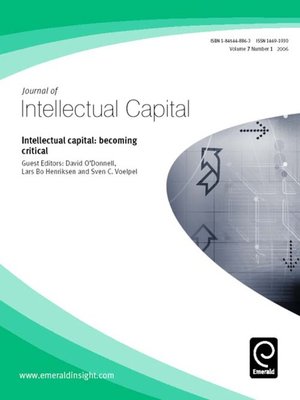Journal of Intellectual Capital, Volume 7, Issue 1
ebook ∣ Intellectual Capital: Becoming Critical · Journal of Intellectual Capital
By David O'Donnell

Sign up to save your library
With an OverDrive account, you can save your favorite libraries for at-a-glance information about availability. Find out more about OverDrive accounts.
Find this title in Libby, the library reading app by OverDrive.



Search for a digital library with this title
Title found at these libraries:
| Library Name | Distance |
|---|---|
| Loading... |
This e-book is based on a selection of papers presented to the Intellectual Capital (IC) Stream at the 4th International Critical Management Studies Conference at Cambridge University, UK, in July 2005. As Marr and Chatzkel (2004) put it in an earlier e-bookl - IC is at a “crossroads”; one of these roads takes a critical stance and the purpose of both the CMS stream and this special issue is to initiate some exploratory discourse on IC from this perspective.IC has emerged as an interdisciplinary construction designed to somehow signify the increasingly immaterial or intangible nature of economic value. The basic underlying assumption is that value is created when human, internal organisational, and external processes/relations/resources are aligned to enhance knowledge creation and exploitation. Ideas, and the ability to continuously generate them, are viewed as more important than the traditional triad of land, labour and financial capital. There is, as yet, no currently accepted definition of intellectual capital; indeed, the notion of an essentialist definition of IC is strongly challenged in this issue. The field is very much at the emergent stage, and the focus to date has been primarily mainstream managerialist. Publications by the OECD, The Conference Board in the US, the EU, the World Bank and others plus the World Congress on Intellectual Capital in Canada and the launching of this Journal all signal the increasing focus on a knowledge-based view on economy and society. The time is now opportune to take a more critical stance on this ‘construction’ and particularly on its discourse, underlying assumptions and concealed ‘tyrannies of truth’—this is the purpose of both the CMS4 IC stream at Cambridge and this special issue—on which we placed no boundaries other than that submissions should be constructively critical of theoretical, managerial and organisational assumptions underlying intellectual capital discourse and practice.







